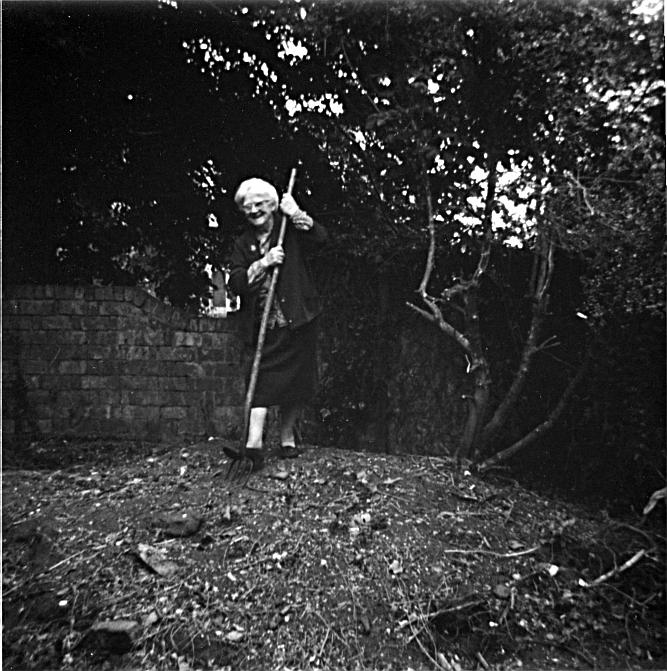Living abroad, one of the most heartbreaking experience you can possibly go through is receiving a phone call over the death of a loved one. I got just that exactly two weeks ago over the death of my grandmother.
My world suddenly spun one minute and stood still the next. I wanted to cry and scream and spill my guts out all at once. It was a moment of disbelief and of hoping that what I just heard can’t be true.
A feeling of emptiness slowly descended over me like a blanket. Adding to the sadness was the realization of how far away I was and that there was nothing I could absolutely do that very moment. I was shattering into pieces inside while everything and everyone around me went on as usual. I left work and I went home. I curled up like a fetus in bed and cried my heart out.
The following day I called up a family member who is based in Singapore and asked her if she was flying home.
“Why should I go home?” was her defiant reply. “I should have visited her when she was alive. It’s too late for that now.” She has always had trouble working out her feelings in difficult situations.
“And there’s no need for you to go too. The airfare is too expensive and you don’t have a nanny to take care of the kids while you’re away. The family back home will understand,” she added.
Reason told me to just say a prayer and stay put. The heavens will be forgiving if I didn’t attend the funeral in person.
But there was no way to ignore that little voice at the back of my head. This was the woman who raised my sister and me when my parent’s marriage fell apart. She was more than a grandmother to me; she was practically my mother.
And a thought whispered with certainty, I have to go back home. And I did.
In the movie Love Happens, the character Dr. Burke said a funeral is an important ritual of the grieving process. Because it shouldn’t be about crying over a life that has ended, but celebrating a life that has been lived.
And the family priest echoed this sentiment when he delivered his sermon during the funeral mass.
“Death is the most misunderstood event in a human being’s life,” he said.
“As sad as it may be for the ones who are left behind and that palpable feeling of emptiness is hard to live with for awhile, we have to bear in mind that a life has been lived. And for that, even through our tears, we have to celebrate.”
And so I went home to take part in this ritual to pay tribute to a remarkable woman who lived until ninety, who taught me how to weather life’s trials at it’s worst and celebrate it with laughter at its best.
She really taught me how to live.
She was a feisty petite woman with the temper of a tidal wave and she can stop you in your tracks with her razor sharp glare if you tick her off; she took no BS from anyone. She reminds me of Shirley MacLaine.
She could charm her way into anyone’s heart and knew how to get things her way.
She blazed the trail of the working mother long before it was acceptable for women to have babies and become entrepreneurs at the same time. She set up her own string of businesses, despite her husband’s well-earning job.
At fifty-eight years of age, she had raised seven kids and survived her husband’s early death.
At 60, she had the agility of a twenty year old, a vision of movement as she walked up and down her farm. She was the most hardworking woman I’ve ever known; she never seemed to tire.
And when her son’s marriage fell apart, she took the job of raising two granddaughters, my sister and myself.
We grew up with two housekeepers, a cook and a laundry woman, yet we were not spared from doing our own share of household chores. She taught us the value of independence, waking up early and getting on with the tasks at hand.
When the family’s finances came crashing down and we had to do away with housekeepers later on, we were quite equipped and ready for it.
My teenage years with her were turbulent. Born in 1920, she was raised in an era where young girls were not supposed to wear jeans and mini skirts, never see a boy outside of the house unchaperoned and had to be home by six in the evening. And if you let a guy hold your hand before you’re married, you have committed the most scandalous act of all!
Growing up with her was like living in a girl scout’s camp. It was all rules and discipline, life in a series of do’s and don’ts.
Being the textbook case of a rebel child, I hated all the values she tried to instill in me and accused her of child labor for all the household chores I had to do. I left home for university resolving never to set foot in her house again. I smoked and partied and did all the things she disapproved of.
As the years passed by, we slowly healed our relationship. The distance in between and sporadic meetings made our hearts grow lovingly towards each other. It became a sweet and tearful reunion every time.
When I moved abroad and realized I had to do things on my own, the wisdom and the value of all the things she taught me suddenly became clear.
I thank the heavens for all the lessons she relentlessly poured on my sister and myself.
And it was not until I gave birth to my first and then my second child later on that I truly understood and appreciated the full extent of all her hard work and sacrifices.
She turned 90 this January; we greeted her a happy birthday and she saw my babies on Skype. With her failing health and all, I asked her to hold on and wait for me, I’ll be flying home in July with the whole family.
That was our last conversation. She joined the ranks of angels today.
A grandmother is a precious gift, a treasure, kind and rare. She can spoil you when you’re a little child and she will braid your hair. She’ll teach you about faith and she’ll worry when you’re far away.
And when your own mother decides to leave, she will take over and do all the things a mother should, and she’ll pray for you everyday.
 This was her dream internship. She’s worked on her application for over a year, meticulously preparing the necessary papers and complying with all immigration requirements.
This was her dream internship. She’s worked on her application for over a year, meticulously preparing the necessary papers and complying with all immigration requirements.
She is a 20-year old hardworking student. Probably one of the most diligent this school has ever seen. She’s set her sights on doing her internship in Australia and all her efforts the last two years were geared towards that end.
Her parents moved to Holland when she was three. And this is the only country she’s ever known. The only country whose traditions and values she’s embraced, whose education system has molded her and whose principles have shaped her into everything that she’s believed in.
Most times however, there exists the unavoidable clash between the parents’ desire to preserve their beliefs and practices back home. And it creates confusion and friction because The Netherlands has shown her there is equality between men and women and she wants to embrace that. But her father is borne of the country where the women were brought up to be submissive, because that’s all he’s ever known.
She wonders how will she find her own identity in this clash of cultures?
She decides to go away as far as possible. Far away from the looming presence and influence her family and the country of birth she barely knows have always had over her.
To build a life of her own. To experience freedom in all its entirety. To walk the streets without carrying the stigma of her headscarf screaming “I-am-a-Muslim” and all things tied to it. To feel her hair blowing in the wind, without the push and pull of the outside forces threatening her every choice.
So after a year of phone calls and complying with Australian immigration and student visa requirements, she finally gets approval. The flight is booked; the ticket is in her hand. She can’t contain her excitement.
Two weeks before departure she gets a phone call from the immigration and visa department of the Australian embassy in Berlin.
Ooops. By the way, you have to submit yourself for a lung x-ray examination and your doctor has to send the results from their clinic directly to our Health Center in Sydney.
“We will perform the x-ray but you are responsible for sending the result yourself”, was the Dutch doctor’s reply.
In theory, it takes two weeks of processing and that’s the only time she’ll be given the green light to fly … in practice, it takes a month.
What happens next is a spiral of events the stuff Murphy’s Law is made of.
Doctor refuses to send the x-ray result, she sends it herself. It gets lost in the mail, she needs to go through another x-ray exam. Doctor refuses again to send the result straight from the hospital, Australian embassy tells her again it has to be sent directly by the doctor himself to comply with visa policies.
Meanwhile, her school informs her that a month’s delay from the starting date of her internship means she will not be allowed to attend her graduation ceremony. She will not have completed the number of hours to comply with her internship requirements by then.
And you tell this story to everyone and everybody agrees tsk tsk that can’t be right. But no one lifts a finger to make a phone call or write a letter to set things straight.
It doesn’t matter where you have lived the last twenty years of your life, whether you’ve been trekking the mosquito-infested jungles of Taman Negara or contracted tuberculosis in Indonesia, if you have a Dutch passport you don’t need to submit yourself to any testing for tuberculosis and malaria.
But even if you’ve never left The Netherlands for the last twenty years, you are required to get tested and x-rayed for all kinds of diseases known to man.
Because your passport is Moroccan.
You drink ten liters of beer every night in front of the television while your family tiptoe around you. Your wife is terrified of you and you call your daughter a whore when you’re drunk. And in your sober moments you wonder why your child hates you so much.
You dance the night away or huddle in dark corners drugged out, stoned, intoxicated… in the guise of fun and living the good life. You wait and watch the sunrise. Your mind cannot sleep.
You lose yourself in piles of work, busyness, unending deadlines and calendars filled with appointments.
You do not have the courage to confront the questions head on:
Why are you angry and bitter?
Why do you self-destruct?
Why aren’t you living the life you want?
In your waking moments you complain how you’re not getting enough sleep and that there’s too little time to accomplish what’s on the to-do list. It is dark outside, the weather is gloomy, how you hate it when it rains. And it goes on and on.
It is quite hard to maintain a positive attitude when the universe doesn’t align with your wishes.
If you stop the incessant chatter and make room for the stillness and the silence in your head, then maybe you can hear the inner child within and make peace.
If you cannot see the beauty in the savage waves raging against the shores on a stormy weather, it is not because it’s not there.
If those tiny little hands curling around your finger do not capture your heart because all you hear is the never-ending wailing, then you’ve just missed a most precious moment.
Why are you so lost?
You have complete power at every moment to change the things you are unhappy with. Or you can choose to be happy and turn unfortunate events into opportunity.
It has never been about how wonderful your tomorrow will be; it has always been about how you live today.
Anyone who has ever been a teacher can most certainly agree with me that while teaching can be both a noble and inspiring work to do; it can also be one of the most exasperating at times.
Consider the excitement of heading to a class to share a new concept or theory or idea only to find out only half the number of students who signed up for the course is present.
It happens. You don’t always know why. Maybe they had personal or financial issues, or they found the same course online with elearners or another institution. Sometimes it can be shocking, how many students drop out after signing up.
But there is always a core group of five or six students who will be there consistently, who will put in the effort, do the work and hand it in on time. They may not always be the smartest, but statistics show that they are the ones who will make it to graduation day.
In a world of get-rich-quick schemes where the lottery draw gets more airtime than any other ad campaign, a lot of people these days would rather try their hands on something that delivers a fast buck.
Only a very few people are willing to invest the time, money and energy to produce the kind of work that makes us believe geniuses exist in our midst.
But those who have persevered all these years doing the work that they love or the work that will feed the children know that they have to keep doing it because of what’s at stake. Even when they feel like giving up at times.
There is no such thing as an overnight success. The most successful people who achieve instant fame and recognition for one piece of art, a book, an idea or a marketing advice know that it was the constant production of countless shitty projects in the past that got them to where they are now. Those works will never see the light of day, but they were necessary in completing that journey.
The artist knows this story all too well. It is putting the brush to the canvas, or notes to the lyrics and words on that blank page even when the muse is off somewhere else in Harry Potter land.
It is showing up for your job or an appointment on days you’d rather be somewhere else because you want to honor your agreements.
It is staying in a marriage and trying to work things out when the going gets rough because you’ve committed yourself to it. Because it’s not always about you anymore. It is about those little lives whose very existence and the very person they will become is dependent on your decision to save or abandon their only known source of comfort and stability.
Elizabeth Gilbert, author of the bestselling book Eat, Pray, Lovesaid it best in her powerful and inspiring speech on nurturing one’s creativity as an artist; to just keep on doing the work even when it is at times daunting, and to continue showing up for your piece in it:
“Ole to you nonetheless, just for having the sheer human love and the stubbornness to keep showing up.”





